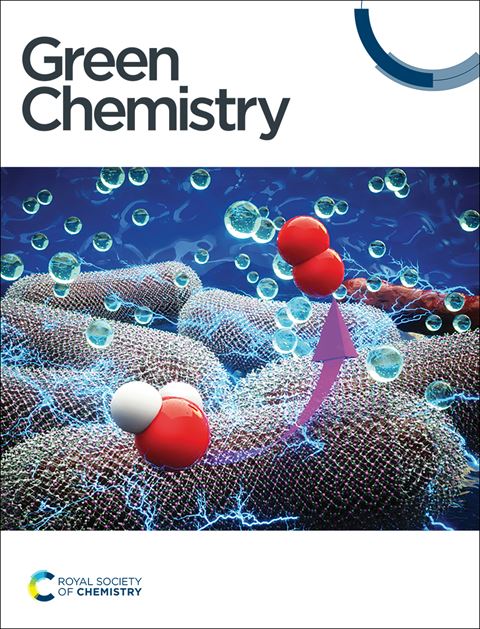Boosting engineering strategies for plastic hydrocracking applications: a machine learning-based multi-objective optimization framework†
IF 9.3
1区 化学
Q1 CHEMISTRY, MULTIDISCIPLINARY
引用次数: 0
Abstract
The escalating global demand for plastics, combined with inadequate recycling strategies, has resulted in severe environmental challenges. While previous research has explored various waste plastic recycling methods, the development of efficient and sustainable technologies remains a complex, time-intensive endeavor, involving extensive experimental data, catalyst design, and process optimization. In this study, we introduce, for the first time, a novel waste plastic pyrolysis oil hydrocracking process (WPOH) and its optimized variant (WPOH-Pro), which uniquely integrates process simulation with advanced deep learning models for multi-objective optimization. This innovative approach accelerates process parameter optimization, setting it apart from existing studies. By leveraging deep learning and comprehensive process modeling, our framework not only optimizes economic performance but also addresses key environmental concerns. The results of our study indicate that the WPOH-Pro process enhances net profit by 50.44% relative to the WPOH process. This improvement is primarily attributed to increased yields of gasoline and naphtha, with an associated production cost of $4.58 million per annum. Furthermore, lifecycle analysis reveals a 22.9% reduction in non-renewable energy consumption, alongside a substantial decrease in greenhouse gas emissions, quantified at 390.24 tCO2eq. per million GDP. In comparison with the WPOH process, the WPOH-Pro process achieves a reduction in CO2 emissions of 99.38 tCO2eq. per million GDP. These findings highlight the ecological benefits of the WPOH-Pro process. This pioneering work in combining process simulation and deep learning-driven optimization offers a significant leap forward in the waste plastic recycling field. It provides a robust foundation for the engineering application of waste plastic hydrocracking technologies and serves as a valuable reference for promoting the circular economy. By offering practical insights into sustainable waste recycling, this study paves the way for future innovations and the industrial adoption of more efficient and environmentally friendly recycling technologies.

促进塑料加氢裂化应用的工程策略:基于机器学习的多目标优化框架
全球对塑料的需求不断上升,再加上回收战略的不足,导致了严峻的环境挑战。虽然以前的研究已经探索了各种废塑料回收方法,但开发高效和可持续的技术仍然是一项复杂的、耗时的努力,涉及大量的实验数据、催化剂设计和工艺优化。在本研究中,我们首次介绍了一种新的废塑料热解油加氢裂化工艺(WPOH)及其优化变体(WPOH- pro),该工艺独特地将过程模拟与先进的深度学习模型相结合,用于多目标优化。这种创新的方法加速了工艺参数的优化,使其与现有的研究不同。通过利用深度学习和综合过程建模,我们的框架不仅优化了经济绩效,还解决了关键的环境问题。研究结果表明,与WPOH工艺相比,WPOH- pro工艺的净利提高了50.44%。这种改善主要是由于汽油和石脑油的产量增加,每年的相关生产成本为458万美元。此外,生命周期分析显示,不可再生能源消耗减少了22.9%,同时温室气体排放大幅减少,量化为390.24亿吨二氧化碳当量。每百万GDP。与WPOH工艺相比,WPOH- pro工艺的CO2排放量减少了99.38 tCO2eq。每百万GDP。这些发现突出了WPOH-Pro过程的生态效益。这项将过程模拟与深度学习驱动优化相结合的开创性工作为废塑料回收领域提供了重大飞跃。为废塑料加氢裂化技术的工程应用奠定了坚实的基础,为促进循环经济的发展提供了有价值的参考。通过提供可持续废物回收的实际见解,本研究为未来的创新和工业采用更有效和环保的回收技术铺平了道路。
本文章由计算机程序翻译,如有差异,请以英文原文为准。
求助全文
约1分钟内获得全文
求助全文
来源期刊

Green Chemistry
化学-化学综合
CiteScore
16.10
自引率
7.10%
发文量
677
审稿时长
1.4 months
期刊介绍:
Green Chemistry is a journal that provides a unique forum for the publication of innovative research on the development of alternative green and sustainable technologies. The scope of Green Chemistry is based on the definition proposed by Anastas and Warner (Green Chemistry: Theory and Practice, P T Anastas and J C Warner, Oxford University Press, Oxford, 1998), which defines green chemistry as the utilisation of a set of principles that reduces or eliminates the use or generation of hazardous substances in the design, manufacture and application of chemical products. Green Chemistry aims to reduce the environmental impact of the chemical enterprise by developing a technology base that is inherently non-toxic to living things and the environment. The journal welcomes submissions on all aspects of research relating to this endeavor and publishes original and significant cutting-edge research that is likely to be of wide general appeal. For a work to be published, it must present a significant advance in green chemistry, including a comparison with existing methods and a demonstration of advantages over those methods.
 求助内容:
求助内容: 应助结果提醒方式:
应助结果提醒方式:


